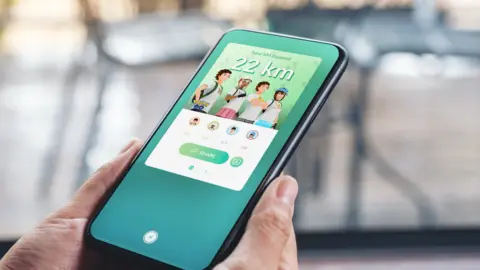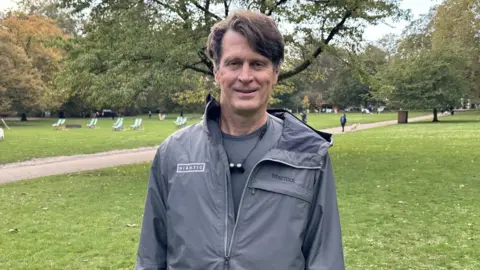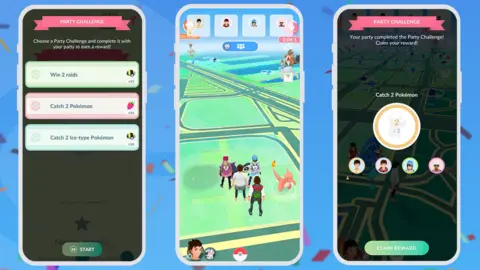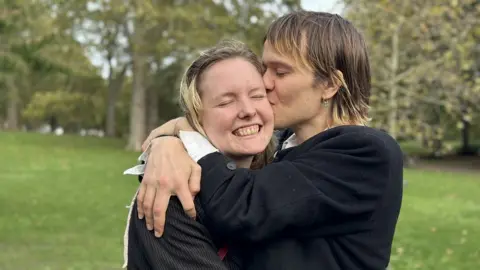Pokémon Go creator John Hanke says it's not game over for the app
 Niantic
NianticFor decades now, fans of Pokémon have been on a mission to "catch 'em all".
Crazes have followed the cute creatures since they first launched on Nintendo's Game Boy in 1996 - with their surprise success sparking a global frenzy dubbed "Pokémania".
And in 2016, it felt like everyone was hunting for virtual monsters once again when Pokémon Go fever seemed to sweep the globe.
The smash-hit mobile game used augmented reality (AR) to take the search from the sofa to the streets, and its early days were marked by regular crashes due to extreme demand.
Millions still play daily, according to Niantic, the company behind it, but the game has struggled to recapture that early success.
User numbers are way down since that early peak and long-time fans are unhappy at recent changes.
Nevertheless, the game's creator John Hanke insists the game is "definitely going very strong" when BBC Newsbeat joins him for a Pokémon hunt in a central London park.
Of course, you'd expect him to say that, but he does have a track record for making a success of software.
Even if you've never snaffled a Snorlax, poached a Pikachu or collared a Charizard in Pokémon Go there's a pretty good chance you've used one of his other inventions, Google Maps.
Pokémon Go is based on technology from Google Maps and Niantic's first game, Ingress - a capture the flag-style multiplayer game where teams battle to control territories.

John says his inspiration for Google Maps was using new technology to help people find useful information, and he's still excited about ways to use new devices such as smart glasses, headsets and connected watches.
"Phones are good because it's the technology we have today," he says. "But it's still not perfect, because it's kind of distracting."
"I'm most excited about those that don't cut you off from other people," says John.
John says he's taking a particular interest in mixed reality devices, such as Instagram owner Meta's new headsets and Apple's Vision Pro, launching next year.
"Those are the kinds of devices that we're leaning into," he says.
"Because they're devices you can use when you're out for a walk and with your friends, and they don't get in your way".
John predicts that "2024 is going to be a breakthrough year for AR", especially as it converges with artificial intelligence (AI).
He says Niantic is looking to deploy this in Pokémon Go to deepen the interplay between its real and virtual elements.
The company hopes to launch an AI-powered feature next year that will allow the creatures to be "situated in the environment and respond to things in the environment in a realistic way".
This paints a rosy picture of the future of augmented reality technology, but it isn't proving to be so simple.
This summer, Niantic slashed its workforce by a quarter, laying off 230 employees and closing its office in Los Angeles.
It also announced that many of its games based on popular franchises like Harry Potter, Marvel and Transformers would either not go ahead or would close early.
"It was very unfortunate that we had to do that," says John.
"But it did allow us to get smaller and more focused. In the end that's probably a healthy thing."
 Niantic
NianticWhile its other games have had mixed results, Niantic is hoping it can increase the time and money people spend in Pokémon Go, and tempt lapsed users back with new features and game modes.
The latest, called Party Play, focuses on something Pokémon Go has always done well - bringing people together.
Trainers, as players call themselves, can team up with three friends and see them on the same screen as they go out completing missions together.
It mirrors the lively community scene that's built up around the game, with events still regularly taking place that bring fans on joint walks around their local areas.
Catching feelings
For some, it's even led to them falling in love and finding themselves a new partner.
Enter Hilma, 22, and Albin, 26, who say their relationship is all thanks to Pokémon Go. Originally from Sweden, both moved to London to study fashion.
Albin says he decided to redownload the app when he realised Hilma was a trainer so he had an excuse to ask her out.
"Our first date was a Pokémon Go date," says Hilma, adding that they've had lots more since.
The couple say the game has also helped them to make other friends and explore their new hometown.

In fact, they chose to do part of their course in London because it hosted a big event for fans, called Go Fest, this year.
"Of course you get a lot of people that don't get it. But I think as soon as we explain, they understand," says Hilma.
"It's so uncool, so it's so fashion. Gaming is the most fashion thing you can do."
Albin says the idea of making Pokémon Go more realistic with wearable tech sounds interesting, but current headsets "would need to be a bit more slick than they are right now".
Albin and Hilma aren't the first Pokémon Go couple John's met while travelling around the world.
"Really early on there were people who were getting engaged, then getting married, and subsequently I've met their kids," says John.
"Seeing it be something that brings people together is heart-warming, particularly in a world where we need more things that bring us together."


